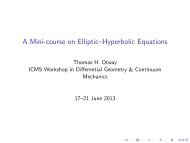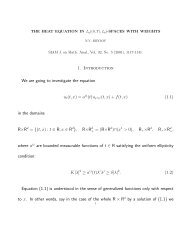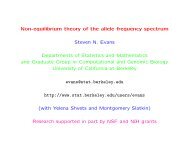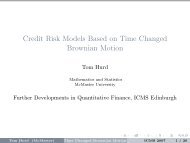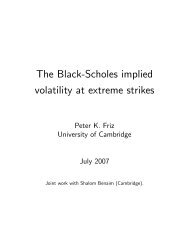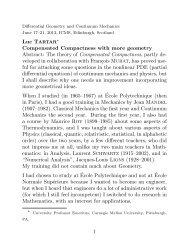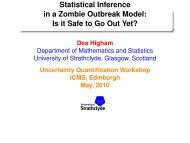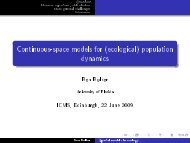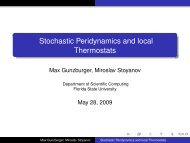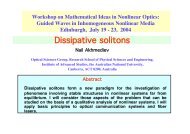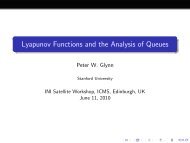Bishop's qc-folding and wandering domains in Eremenko ... - ICMS
Bishop's qc-folding and wandering domains in Eremenko ... - ICMS
Bishop's qc-folding and wandering domains in Eremenko ... - ICMS
Create successful ePaper yourself
Turn your PDF publications into a flip-book with our unique Google optimized e-Paper software.
Critically f<strong>in</strong>ite entire transcendental functions<br />
We denote by S(f ) the set of (f<strong>in</strong>ite) s<strong>in</strong>gularities of f −1 (critical<br />
values, asymptotic values <strong>and</strong> limits of those values).<br />
Def<strong>in</strong>ition: We say that f is critically f<strong>in</strong>ite if S(f ) is f<strong>in</strong>ite.<br />
E λ (z) = λexp(z)<br />
Sn λ (z) = λ s<strong>in</strong>(z)<br />
Theorem (Baker 1984): If f (z) =<br />
∫ z<br />
0<br />
P(t)e Q(t) dt, P <strong>and</strong> Q<br />
polynomials, then f has no w<strong>and</strong>er<strong>in</strong>g <strong>doma<strong>in</strong>s</strong>. Indeed this follows<br />
from a more general statement.<br />
Theorem (<strong>Eremenko</strong>-Lyubich, Golberg-Keen 1986): If f is critically<br />
f<strong>in</strong>ite then f has no w<strong>and</strong>er<strong>in</strong>g <strong>doma<strong>in</strong>s</strong>.<br />
Remark: The proofs adapted Sullivan’s quasi-conformal strategy.<br />
W<strong>and</strong>er<strong>in</strong>g <strong>doma<strong>in</strong>s</strong> <strong>and</strong> Bishop’s <strong>fold<strong>in</strong>g</strong>




